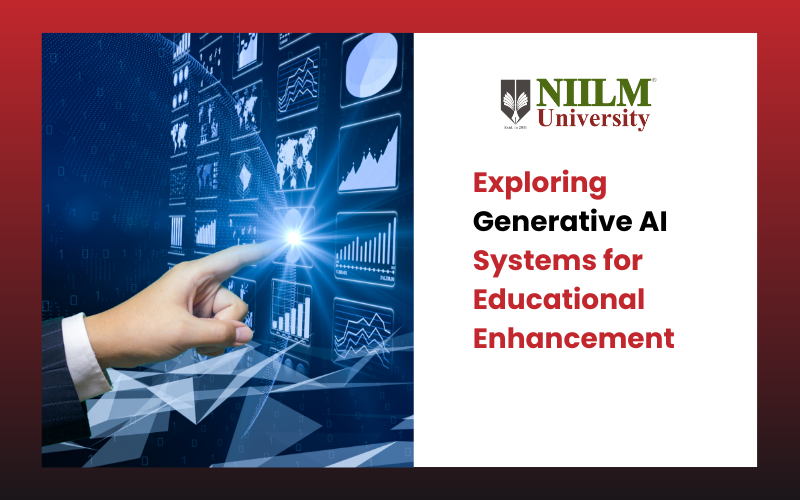Admission Enquiry

Discover how NIILM University offers a top-tier BBA program, fostering academic excellence and preparing students for successful business careers.
In the dynamic landscape of education, technology continues to revolutionize the way we teach and learn. Among the various advancements, Generative Artificial Intelligence (AI) systems are emerging as powerful tools for educational purposes. These systems have the capability to generate content, simulate scenarios, and personalize learning experiences, thereby augmenting traditional educational methods. Let's delve into the realm of Generative AI and understand its implications in education.
Understanding Generative AI
Generative AI refers to systems capable of generating new content, whether it be text, images, music, or even videos, mimicking patterns and structures from a dataset. These systems utilize algorithms such as neural networks to learn from vast amounts of data and create new outputs that resemble the original data.
Applications in Education
1. Content Creation
Generative AI can assist educators in creating vast amounts of educational content efficiently. For instance, AI-powered tools can generate quiz questions, lesson summaries, or even entire lectures based on existing materials. This not only saves time for educators but also ensures the availability of diverse learning resources.
2. Personalized Learning:
One of the most promising aspects of Generative AI in education is its ability to personalize learning experiences. By analyzing students' learning patterns, preferences, and performance data, AI systems can generate customized learning materials tailored to individual needs. This adaptive approach enhances engagement and comprehension, leading to better learning outcomes.
3. Language Learning:
Generative AI systems equipped with natural language processing capabilities can facilitate language learning by generating contextual sentences, dialogues, and interactive exercises. These systems can simulate real-life conversations, provide instant feedback, and adapt to learners' proficiency levels, thereby accelerating the language acquisition process.
4. Simulation and Virtual Labs:
In disciplines like science and engineering, Generative AI can power simulation tools and virtual labs, allowing students to conduct experiments and explore complex concepts in a risk-free environment. These simulations offer hands-on learning experiences, fostering experimentation, problem-solving, and critical thinking skills.
5. Creative Writing and Storytelling:
Generative AI excels in creative tasks such as writing stories, poems, or generating plot outlines. Educators can leverage these capabilities to spark students' creativity, encourage writing practice, and explore literary techniques. Additionally, AI-generated content can serve as inspirational prompts for collaborative storytelling activities.
Challenges and Considerations
While Generative AI holds immense potential in education, several challenges must be addressed:
Quality Control: Ensuring the accuracy and relevance of AI-generated content is crucial to maintain educational standards.
Ethical Concerns: The ethical implications of AI-generated content, including biases and misinformation, need to be carefully examined and mitigated.
Accessibility: Access to AI-powered educational tools should be equitable to avoid widening the digital divide among students.
Data Privacy: Protecting students' privacy and sensitive data in AI-driven learning environments is paramount.
Are there challenges in using Generative AI for education?
Privacy is one of the biggest concerns for using Generative AI systems in the academic world. AI systems give you access to a high volume of data to produce content. If the data is about a student's sensitive details, there is a risk of data breaches. So, academic institutions should implement procedures that safeguard student’s data and ensure privacy. Generative AI systems for learning purposes need to be more sophisticated to avoid these problems in the future.
Conclusion
Generative AI systems are revolutionizing education by offering innovative solutions to age-old challenges. From personalized learning experiences to creative content generation, these systems are reshaping the educational landscape. However, as we embrace this transformative technology, it's essential to proceed with caution, addressing ethical, privacy, and accessibility concerns. By harnessing the power of Generative AI responsibly, we can unlock new opportunities for enhancing teaching and learning experiences, empowering learners to thrive in an ever-evolving world.
Copyrights © 2024 NIILM UNIVERSITY. All rights reserved.